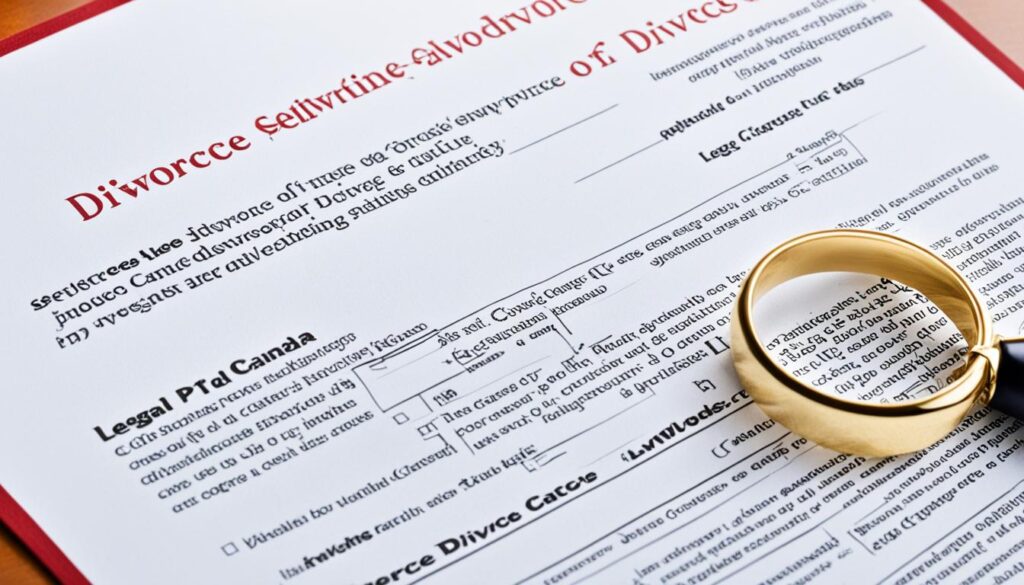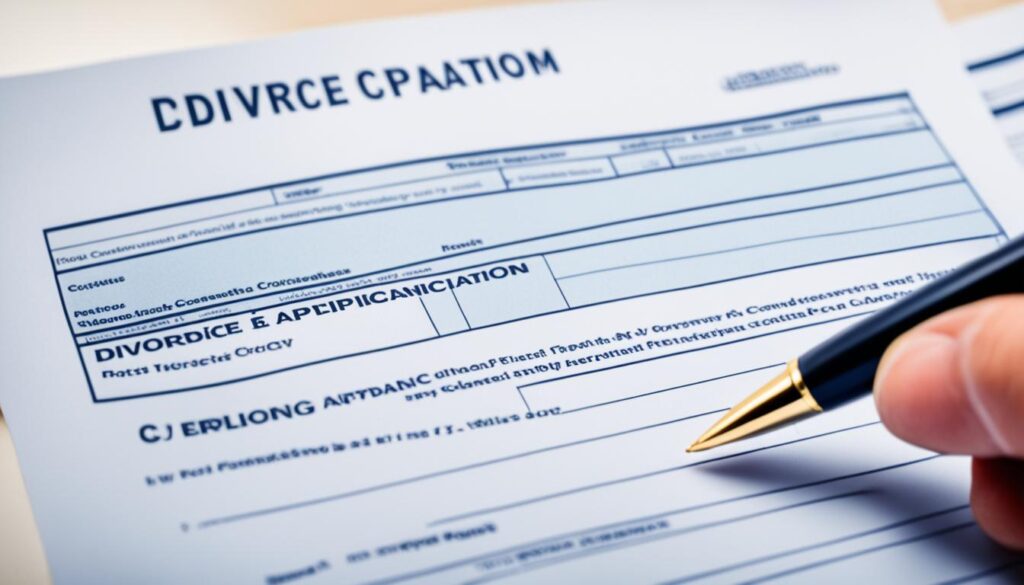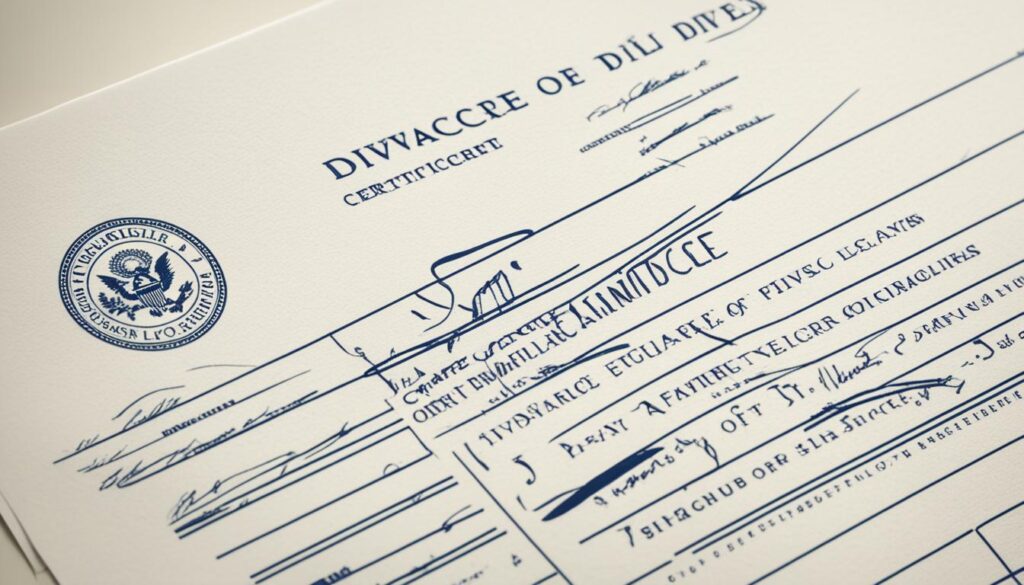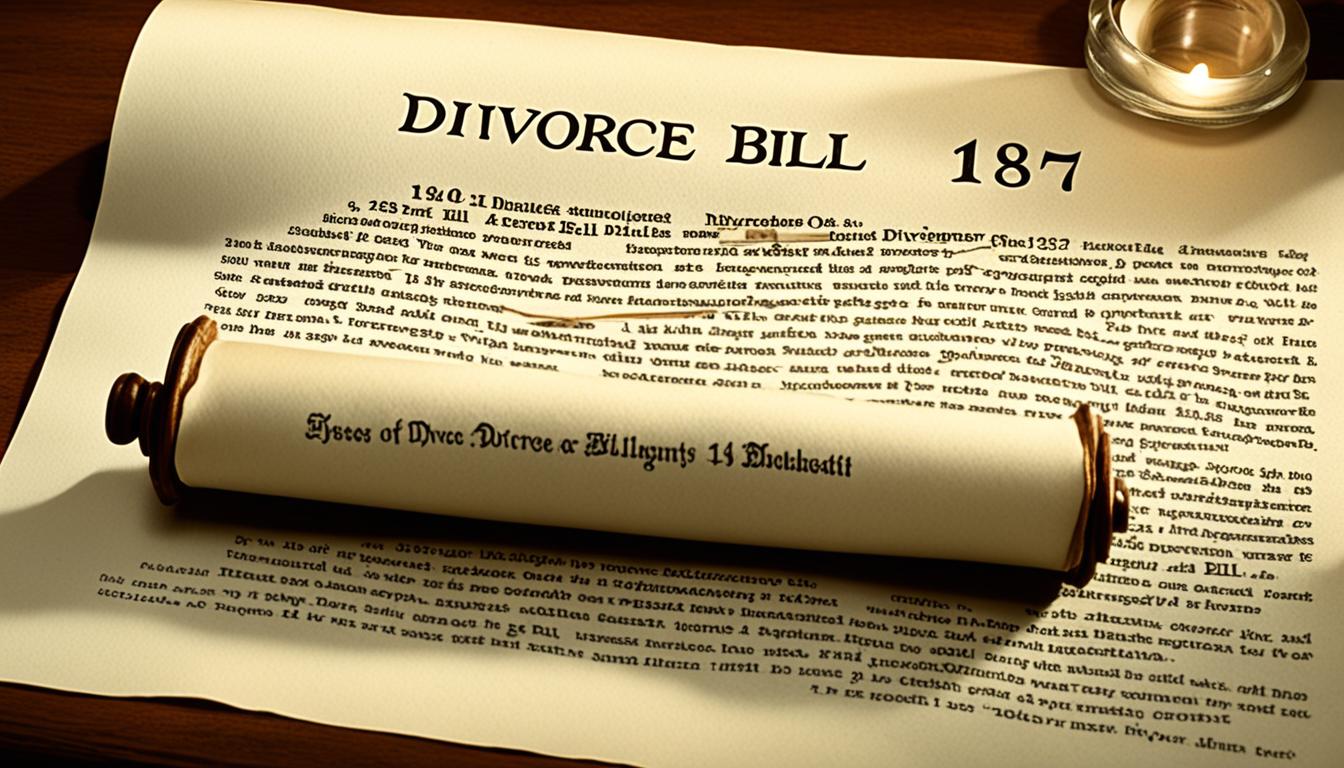Did you know that the divorce rates in Canada have been on the rise over the years? Statistics Canada reported that in 2019, there were 70,226 divorces granted throughout the country. This unexpected statistic emphasizes the commonality of divorce and the importance of having a thorough understanding of the divorce process, laws, and available support services in Canada.
Key Takeaways:
- Divorce rates in Canada have been steadily increasing.
- The divorce process in Canada is governed by the federal Divorce Act.
- Provincial or territorial laws may also apply to certain aspects of divorce.
- Support services such as mediation and lawyer referral services can provide assistance during the divorce process.
- Legal representation can help individuals navigate the complexities of family law.
What is Divorce in Canada?
Divorce in Canada is the legal process that married couples undergo to end their marriage. It is a court-authorized dissolution of the marriage, resulting in the issuance of a divorce certificate that serves as proof that the couple is no longer married. Only married couples can get a divorce, and it can only be granted by a court.
| Key Points: |
|---|
| Divorce is the legal process to terminate a marriage. |
| Couples must obtain a court-authorized divorce certificate. |
| Only married couples are eligible for a divorce. |
| Divorce can only be granted by a court. |

“Divorce is not the end of the world, it is the end of a relationship, but it doesn’t define who you are.”
Divorce marks the legal end of a marriage, enabling individuals to move forward with their lives separately. It is a significant decision that requires careful consideration and understanding of the legal process involved. By obtaining a divorce certificate, former spouses can clearly establish their new marital status and pursue future endeavors independently.
Laws Governing Divorce in Canada
The process of divorce in Canada is governed by the Divorce Act, a federal law that applies to all divorce cases in the country. The Divorce Act establishes the conditions for getting a divorce and addresses various important issues related to divorce proceedings. These issues include child support, spousal support, and parenting arrangements for children involved in divorce cases.
The Divorce Act forms the foundation of divorce laws in Canada, ensuring consistency and fairness across the country. It sets out the legal framework and guidelines that must be followed when seeking a divorce. This federal law applies to divorces involving both married couples and same-sex couples who are legally married.
In addition to the Divorce Act, provincial and territorial laws can also come into play in certain aspects of divorce. These laws may govern specific matters, such as the division of marital property. While generally similar to the rules under the Divorce Act, it’s important to note that provincial/territorial laws may have some differences. It’s essential to consult the relevant legislation in your province or territory to understand the specific requirements and procedures that apply to your divorce case.
Here is a summary of the key areas covered by the Divorce Act and provincial/territorial laws:
- Child Support: Both the Divorce Act and provincial/territorial laws establish guidelines for determining child support payments. These guidelines take into account factors such as the income of the parents, the number of children, and the custody arrangements.
- Spousal Support: The Divorce Act and provincial/territorial laws also address the issue of spousal support, sometimes referred to as alimony. These laws outline the factors that must be considered when determining spousal support, such as the length of the marriage, the financial needs and abilities of each spouse, and any existing agreements or arrangements.
- Parenting Arrangements: The Divorce Act and provincial/territorial laws provide guidance on parenting arrangements for children of divorced or separating couples. These laws prioritize the best interests of the child and aim to ensure that both parents have meaningful involvement in the child’s life, taking into account factors such as the child’s age, preferences, and the ability of each parent to provide care and support.
Laws Governing Divorce in Canada
| Aspect of Divorce | Divorce Act | Provincial/Territorial Laws |
|---|---|---|
| Child Support | Guidelines for determining child support payments | May include additional guidelines or considerations |
| Spousal Support | Factors for determining spousal support | May have specific provisions or guidelines |
| Parenting Arrangements | Guidelines for determining parenting arrangements | May have additional considerations or requirements |
Understanding these laws is crucial when navigating the divorce process in Canada. It’s recommended to consult with a family law lawyer who can provide expert guidance and ensure that your rights and obligations are protected.

Steps to Get a Divorce in Canada
To get a divorce in Canada, individuals need to follow specific steps and procedures. Here is a breakdown of the process:
-
Step 1: Determine Province/Territory
First, individuals should determine the province or territory where they or their spouse resides. This will determine the court where they need to submit their divorce application.
-
Step 2: Complete Divorce Application
Next, individuals need to complete a divorce application form. The specific form and required documents may vary depending on the province or territory. Seek guidance from the appropriate court or consult with a family law lawyer for assistance.
-
Step 3: Submit Application
After completing the divorce application, individuals must submit it to the court. Ensure all necessary documents and fees are included and follow the court’s instructions for submission.
-
Step 4: Serve Application to Spouse
Once the application is submitted, the court will provide instructions on how to serve the divorce application to the spouse. This ensures that the spouse is aware of the divorce proceedings.
-
Step 5: Establish Reason for Divorce
In the divorce application, individuals need to establish the reason for the divorce. There are three ways to show that a marriage has broken down: separation for at least one year, physical or mental cruelty, or adultery. Provide the necessary information and evidence to support the chosen reason.
-
Step 6: Attend Court Hearings (if necessary)
In some cases, court hearings may be required to resolve any disputes or outstanding issues related to the divorce, such as child custody or division of assets. Attend all scheduled court hearings and follow the court’s instructions.
-
Step 7: Obtain Divorce Judgment
If the court is satisfied with the divorce application and all requirements have been met, a divorce judgment will be granted. This legally ends the marriage.
-
Step 8: Apply for Divorce Certificate
After the divorce judgment is obtained, individuals can apply for a divorce certificate from the court. The certificate serves as official proof of the divorce and its effective date.
It’s important to note that the specific steps and procedures may vary depending on the province or territory. It’s recommended to consult with a family law lawyer or seek guidance from the court for accurate and up-to-date information.

A divorce application is one of the crucial steps in the divorce process. Completing and submitting this form is essential to initiate the legal proceedings for ending a marriage.
Support Services for Divorce in Canada
When going through a divorce in Canada, individuals can benefit from leveraging various support services to help them navigate the process. These services offer guidance, assistance, and resources to address the legal, emotional, and practical aspects of divorce. Two key support services available to individuals are family justice services and lawyer referral services.
Family Justice Services
Family justice services play a crucial role in supporting families during the divorce process. These services focus on facilitating effective communication, negotiation, and resolution of family-related issues, such as child support, custody, and property division. One common form of family justice service is mediation.
Mediation involves a neutral third party, known as a mediator, who assists divorcing couples in reaching mutually agreeable solutions. The mediator helps facilitate discussions, explores different options, and encourages open communication between the spouses. Mediation provides a less adversarial approach to resolving disputes and can help divorcing couples maintain an amicable relationship, especially when children are involved.
Through mediation, individuals have the opportunity to voice their concerns, express their needs, and work together to find practical solutions that best meet the interests of both parties. This collaborative approach can often result in more satisfactory outcomes for families, reducing conflict and stress during the divorce process.
Lawyer Referral Services
In addition to family justice services, some provinces and territories in Canada offer lawyer referral services to individuals seeking legal assistance for their divorce. These services connect individuals with qualified family law lawyers who specialize in divorce cases.
Lawyer referral services provide individuals with access to legal advice, guidance, and representation throughout the divorce process. Family law lawyers can provide expert insights into relevant laws, rights, and obligations, ensuring individuals make informed decisions about child custody, support, and property division.
By consulting with a lawyer, individuals can obtain personalized legal advice tailored to their unique circumstances. Lawyers can help individuals understand the legal implications of their decisions, advocate for their interests, and navigate complex family law processes, such as court proceedings and negotiations.
It is important to note that lawyer referral services may offer reduced-rate or free initial consultations, making legal representation more accessible to individuals who may otherwise hesitate to seek professional advice due to financial constraints.
Overall, both family justice services and lawyer referral services play integral roles in providing guidance, support, and resources to individuals going through a divorce in Canada. By leveraging these services, individuals can access the necessary tools and expertise to effectively navigate the legal complexities and emotional challenges of divorce.
Child Support and Parenting Arrangements
When couples with children go through a divorce in Canada, establishing child support and parenting arrangements is crucial. It is advisable for parents to come to an agreement on these matters, but if they cannot, the court can intervene and issue orders.
Child support refers to the financial assistance provided by one parent to the other for the upbringing of their children. It is based on the principle that both parents have a responsibility to financially support their children, regardless of the relationship status.
Children’s needs should always be the top priority when determining child support. The court considers factors such as the income of each parent, the custody arrangement, and the child’s standard of living before divorce. These factors help determine the amount of child support that is fair and appropriate.
Parenting arrangements refer to the schedules and responsibilities each parent has in relation to the children. It includes decisions about where the children will live, visitation schedules, and involvement in important aspects of the child’s life such as education and healthcare.
It is generally in the best interest of the children for parents to form a cooperative parenting plan that promotes stability and consistency. When both parents play an active role in their children’s lives, it can greatly benefit the child’s emotional well-being.
“Parents are encouraged to prioritize the well-being and best interests of their children when establishing parenting arrangements.”
In situations where parents are unable to agree on child support or parenting arrangements, they can seek assistance from the court. The court has the authority to make decisions on these matters based on the best interests of the children involved.
It is essential to note that a court cannot grant a divorce unless reasonable child support arrangements have been made for the children of the marriage. This requirement ensures that children are adequately supported throughout the divorce process and beyond.
Parents who are unsure about child support guidelines or need help navigating parenting arrangements can consult a family law lawyer or seek support from family justice services. Mediation can be a valuable tool for parents who wish to resolve disputes and reach mutually satisfactory agreements without involving the court.
Overall, establishing clear and fair child support and parenting arrangements is crucial for the well-being of children during and after a divorce. By prioritizing the needs of their children, parents can create a stable and supportive environment for them to thrive.

| Benefits of Establishing Child Support and Parenting Arrangements | Importance of Court Orders |
|---|---|
|
|
Legal Representation in Divorce
Family law can be complex, and individuals going through a divorce in Canada may benefit from obtaining legal advice. Consulting a family law lawyer can help individuals understand their rights and obligations and navigate the legal process. Some provinces and territories offer lawyer referral services, providing individuals with access to reduced-rate or free consultations with family law lawyers. However, individuals also have the option to represent themselves in court, although this can be challenging due to the complexity of family law.
Why Seek Legal Advice?
Obtaining legal advice is crucial when going through a divorce in Canada. Family law lawyers specialize in divorce cases and can provide valuable insights and guidance tailored to individual situations. They can help individuals understand their rights and obligations regarding child custody, child support, spousal support, and property division. With their expertise, lawyers can navigate the intricacies of family law and ensure that individuals make informed decisions throughout the divorce process.

The Importance of Lawyer Referral Services
Many provinces and territories in Canada offer lawyer referral services, which can be a helpful resource for those seeking legal representation in their divorce. These services connect individuals with family law lawyers who can provide initial consultations at reduced rates or even for free. This access to legal professionals can significantly benefit individuals by providing them with an opportunity to discuss their case, understand their legal options, and make informed decisions.
Self-Representation: A Challenging Option
Although self-representation is an option in a divorce case, it can be challenging due to the complexity of family law. Without legal expertise, individuals may struggle to understand the legal processes, navigate court procedures, and effectively advocate for their rights. Family law lawyers possess the knowledge and experience needed to present compelling arguments and negotiate on their clients’ behalf, increasing the likelihood of achieving favorable outcomes.
Pros and Cons of Legal Representation and Self-Representation in Divorce
| Pros | Cons |
|---|---|
| Expertise in family law | Costly legal fees |
| Access to legal advice | Emotional strain of self-representation |
| Legal representation in negotiations and court proceedings | Lack of knowledge in legal processes |
| Guidance in decision-making | Risk of overlooking important legal aspects |
While self-representation may seem like a cost-effective option, it is essential to weigh the potential drawbacks. Without the help of a lawyer, individuals may encounter difficulties in understanding their rights, submitting required documents, and presenting their case effectively. Legal representation provides the necessary expertise and support to navigate the complexities of family law, ensuring that individuals are well-equipped to protect their interests throughout the divorce process.
Waiting Period and Reconciliation Attempts
The waiting period plays a crucial role in the divorce process in Canada. The length of the waiting period depends on the reason for the marriage breakdown. In cases of separation, couples are typically required to have lived apart for at least one year before a divorce can be granted.
This separation period allows individuals to reassess their relationship, consider reconciliation, or make decisions about the future. During this period, couples have the opportunity to attempt reconciliation without affecting their divorce application.
If couples choose to reconcile during the waiting period, they can spend up to 90 days together without it impacting their divorce. This temporary period allows them to explore the possibility of rebuilding their relationship without restarting the separation period from scratch.
However, if reconciliation efforts are unsuccessful or if couples choose not to attempt reconciliation, the divorce process can proceed as if the period spent together did not occur. This means that if the parties separate again after attempting reconciliation, the initial separation date remains the starting point for the waiting period.
It is essential to note that not all couples choose to attempt reconciliation during the waiting period. Some may have already made the decision to end their marriage and move forward with the divorce process.

| Waiting Period | Reconciliation Attempts |
|---|---|
| If Separation is the Reason: | At least one year of living apart |
| Opportunity for Reconciliation: | 90-day period during the waiting period |
| Results of Reconciliation Attempts: | Does not affect the waiting period |
Divorce Certificate and Records
After a divorce is granted by the court, the divorce takes effect after 31 days. Individuals can request a divorce certificate from the court that processed the divorce, confirming the divorce and the date it took effect. This certificate serves as official proof that the couple is no longer married and may be needed for various legal and administrative purposes.
It is important to keep the divorce certificate in a safe place as it may be required when updating personal documents, such as driver’s licenses, passports, and social insurance numbers. The certificate can also be used to change one’s marital status with financial institutions, insurance companies, and government agencies.
If individuals are uncertain which court processed their divorce, they can contact the Central Registry of Divorce Proceedings for assistance. The Central Registry is a central database that tracks divorce cases across Canada. It can help individuals locate the court that handled their divorce and provide access to relevant information and records.

| Information | Details |
|---|---|
| What is it? | A legal document that confirms the divorce and its effective date. |
| Importance | Needed for updating personal documents and changing marital status with various institutions and agencies. |
| Availability | Can be obtained from the court that processed the divorce or by contacting the Central Registry of Divorce Proceedings. |
Divorce Outside of Canada
Non-residents who do not reside in Canada cannot get a divorce under the Divorce Act. However, there may be options available under the Civil Marriage Act for ending a Canadian marriage.
To pursue a divorce under the Civil Marriage Act, individuals must have married in Canada and be unable to dissolve the marriage in their country of residence due to a lack of recognition. The process under the Civil Marriage Act only terminates the marriage, and other issues such as child support and spousal support must be resolved according to the laws of the individual’s country of residence.

“Non-residents who do not reside in Canada cannot get a divorce under the Divorce Act.”
Legal Advice and Disclaimer
It is essential to note that the information provided in this article does not constitute legal advice. Family law matters can be complex and require personalized guidance based on the specific circumstances of each case. Therefore, it is strongly recommended that individuals seek legal advice from a qualified family law lawyer to obtain accurate and relevant information.
Provincial and territorial bar associations often offer lawyer referral services, providing individuals with access to a network of experienced family law lawyers. These services can connect individuals with lawyers who specialize in divorce cases and can provide the necessary guidance and representation throughout the legal process.
When seeking legal advice, individuals should consider scheduling initial consultations with family law lawyers to discuss their rights, obligations, and options. Some lawyers may offer free or reduced-rate consultations to help individuals understand the legal implications of their divorce and make informed decisions.
The Importance of Legal Advice
Obtaining legal advice from a family law lawyer can provide several benefits throughout the divorce process, including:
- Expertise: Family law lawyers have a deep understanding of the legal principles, procedures, and precedents relevant to divorce cases. They can provide expert advice tailored to each individual’s situation.
- Clarity: Family law lawyers can help individuals understand their rights and obligations under both federal and provincial/territorial laws. They can explain complex legal concepts in plain language and provide guidance on the best course of action.
- Strategy: A family law lawyer can assist in developing a strategic approach to the divorce process, taking into account the individual’s goals and desired outcomes. They can negotiate on behalf of their clients and represent them in court if necessary.
- Advocacy: Legal representation ensures that an individual’s interests are protected throughout the divorce process. Family law lawyers can advocate for their clients’ rights and pursue a fair resolution, including adequate support, custody arrangements, and equitable distribution of assets.
It is important to consult with a family law lawyer who is licensed to practice in the relevant province or territory. They will have a specific understanding of the local laws and procedures, ensuring the advice provided is accurate and relevant.

Conclusion
Obtaining a divorce in Canada requires following a well-defined process to ensure legal dissolution of a marriage. To begin the divorce process, individuals must submit an application to a court in the appropriate province or territory. Familiarizing oneself with the specific divorce laws and procedures in their region is crucial for a smooth divorce journey.
Support services are widely available to aid individuals during this challenging time. Mediation services provide a platform for resolving various issues, such as child custody, support arrangements, and the division of assets. Lawyer referral services can connect individuals with experienced family law lawyers who can offer expert advice and representation.
Legal representation is highly recommended, given the complexities of family law. A knowledgeable family law lawyer can guide individuals through the entire divorce process, ensuring that their rights and interests are protected. Having a legal professional by one’s side can provide peace of mind and help navigate any legal complexities that may arise.
Once the divorce is granted, it is essential to obtain a divorce certificate from the court that processed the divorce. This certificate serves as proof of the divorce and its legal effects. It is also advisable to maintain relevant records and documentation for future reference or any legal requirements that may arise.










